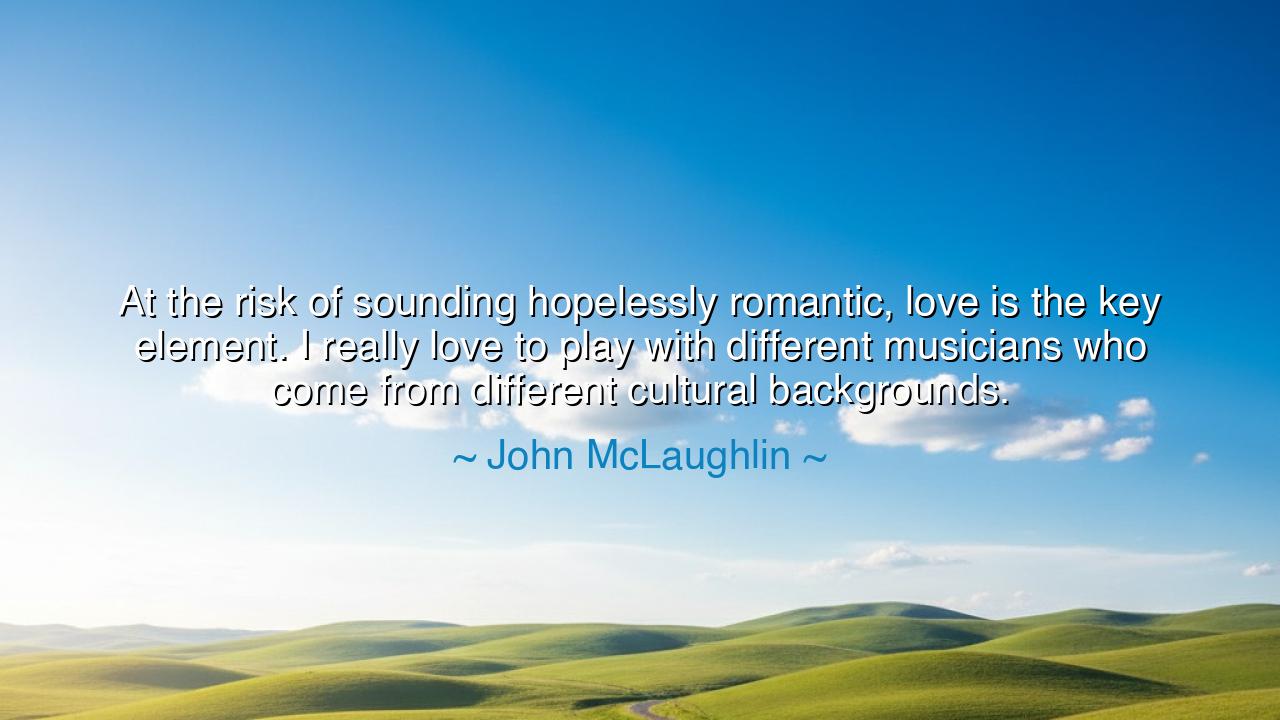
At the risk of sounding hopelessly romantic, love is the key
At the risk of sounding hopelessly romantic, love is the key element. I really love to play with different musicians who come from different cultural backgrounds.






In the words of John McLaughlin, master of strings and seeker of harmony, there rings a truth that is both simple and eternal: “At the risk of sounding hopelessly romantic, love is the key element. I really love to play with different musicians who come from different cultural backgrounds.” Though spoken of music, his words shine far beyond the stage. They speak of life itself, for love—whether between people, nations, or sounds—is the force that unites what is scattered, the bond that turns chaos into harmony.
The ancients knew this truth well. Pythagoras taught that the cosmos itself was music, the “harmony of the spheres,” and that love was the tuning force which brought the discordant notes of creation into order. To McLaughlin, love is not sentimentality but the essential principle of union. It is what allows one soul to meet another without fear, what allows a guitar from the West to converse with a tabla from the East, what allows differences not to clash but to create something higher than either could alone.
To be called hopelessly romantic is often to be mocked for naivety, but McLaughlin embraces the title, knowing that only love allows true collaboration. Without it, there is suspicion, rivalry, and division; with it, there is openness, generosity, and growth. When musicians from different cultural backgrounds join in love, their sounds weave together not as competitors but as companions, forming music that transcends borders. Here, McLaughlin points us to a lesson: love is not weakness—it is the highest form of strength.
History gives us luminous examples. Think of Ravi Shankar and George Harrison, who joined the sitar and the guitar in a union that revealed to millions the depth of Indian music. Their collaboration was not born of commerce but of love—love of sound, of culture, of spirit. Though from different worlds, they created together something that neither tradition alone could have birthed. This is what McLaughlin speaks of: the miracle that arises when love becomes the foundation of art and human encounter.
The deeper meaning of his words is that every encounter—whether of musicians, nations, or lovers—can either divide or unite. If approached without love, differences become obstacles; if approached with love, differences become treasures. The romantic vision is not blind to hardship, but it insists that harmony is possible, and that beauty is born precisely in the meeting of what is unlike. Music, in this sense, becomes a model for life itself.
The lesson is clear: cultivate love as the first principle in all your collaborations. Whether you work with others in art, in labor, in dialogue, or in family, begin with respect, openness, and generosity. Do not fear the “other,” but rejoice in their difference, for in that difference lies the possibility of creation greater than yourself. Love does not erase difference; it transforms it into harmony.
Therefore, O listener, take McLaughlin’s words into your heart: let yourself be hopelessly romantic, not in sentiment, but in conviction that love is the key. In your work, in your friendships, in your encounters with the world’s many voices, choose love as your foundation. For it is love that bridges the distance between cultures, that makes music out of noise, and that reveals the unity hidden beneath all diversity. To live by this truth is to live not narrowly, but expansively, as one who joins the eternal symphony of humanity.






AAdministratorAdministrator
Welcome, honored guests. Please leave a comment, we will respond soon